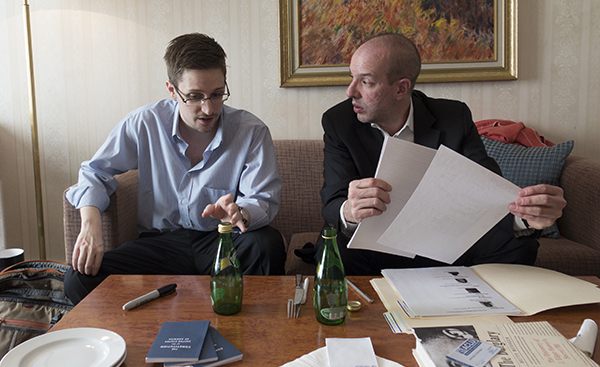NEWSLETTER
|
From the ACLU: “Edward Snowden Wired”
“As a result,” wrote Romero in the summer issue of the ACLU’s magazine Stand, “he is now being pursued by the most powerful government in the world. He faces a life of exile or imprisonment. He’s physically isolated from his family, friends and lawyers. He’s in the middle of an international maelstrom, having provoked the ire of U.S. government officials, and has even had threats made on his life….
“In July (2013), the ACLU began providing Snowden with legal counsel. After ‘chatting’ with him several times over encrypted channels, I flew to Moscow in January to meet him.”
Following are excerpts from Snowden’s responses during his conversation with Romero, which appeared in a question-and-answer format in the magazine:
“My main purpose…was simply to allow the average American to understand the policies of their government that they weren’t asked about. And to allow us, as a civil body, to decide if we thought this was the right thing and the direction we want to continue in….Being able to give that back to my country—being able to give the media its voice back, being able to give the public its voice back—this was about getting our seat back at the table of government….
“Now if I had my way…I would see the government step back from dragnet surveillance, the sort of indiscriminate monitoring and collection of records from people even when they’re not suspected of any crime or any sort of wrongdoing, and instead focus those resources…into the traditional methods of investigation and collection that we know work and keep us safe. Where the government focuses on individuals they suspect to be dangerous actors—people who have committed a crime or are planning to commit a crime—and really use the full range of their authorities, the totality of their capabilities, on the basis of warrants and reasonable suspicion.
“Because we really need to think about whether we want to live in a country where every time we pick up the phone, every time we write an email and every time we make a purchase, it’s recorded. I don’t think that’s good for Americans and I don’t think that’s good for democracy….
“America has been through civil liberties crises before. We’ve been in situations where what was lawful was out of step with what was right. And, just like then, I think we can turn that back. I think we can re-establish that we have certain values that we’re not willing to abandon, and that the Bill of Rights still means something….
“Whether you’re a government employee who took an oath to the Constitution or a private citizen who supports civil liberties, we all have to do what we can to restore the balance of our rights….
“I think the 21st century Fourth Amendment can actually be the same as the 20th-century, and the 19th-century and the 18th-century, because it’s written in such clear terms that it doesn’t need to be rewritten. It’s couched in language like ‘unreasonable search and seizure’, right?...It’s not reasonable for the NSA to collect every phone call of every American, or even the phone numbers or anything like that, without a suspicion justifying it. I sat at that desk, I named the targets, and I can tell you, it’s dangerous and unnecessary. We don’t need it to do the job….
“Speaking truth to power is a dangerous thing, and I knew it would come with a price. But I swore an oath to defend the Constitution of the United States and I
witnessed the NSA violating it on a massive scale. I knew what I had to do: I kept my oath….
“Federal courts have ruled the programs I revealed are Orwellian and likely unconstitutional, Congress has spent more time trying to restrain out-of-control spies than we’ve seen in 40 years, and two separate White House panels concluded the programs never stopped a single domestic terrorist attack….
“None of that would have happened without the involvement of ordinary citizens in this debate, and that’s why an informed public is—and must remain—the foundation of our system….
“These programs have been defended on the ground that they keep us safe, but the record shows…they’ve never stopped a terrorist attack. They’ve never even discovered an unknown terrorist plot. But they’ve cost us billions and billions of dollars that could have been applied to effective means of
investigation….
“And if you think it’s not good for our country to give up our civil liberties in exchange for programs that don’t make us safer but actually put us at risk by wasting resources, you should come together with one voice, call Congress, and say it’s time to end mass surveillance.”
|


